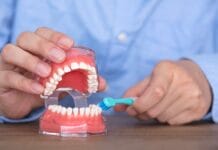It’s common knowledge that poor dental health may lead to serious systemic complications when left untreated. However, scientists have gathered evidence that suggests advanced stages of periodontal disease can also affect a patient’s mental health. The Journal of Clinical Periodontology published an article titled “Periodontal diseases and depression: A pre‐clinical in vivo study” that further explored this theory.1
A Closer Look at Depression
According to the World Health Organization, depression is a mental health disorder that affects over 280 million people around the world.2 Statistics from the National Institute of Mental Health reveal that an estimated 21 million adults in America experienced at least one major depressive episode in 2021.3 Women are more likely to be clinically diagnosed with depression than men.2,3
Depression is typically placed into three categories: mild, moderate, or severe. While a severe depressive episode may cause someone to have delusions or suicidal thoughts, a person suffering from a mild depressive episode may experience noticeable mood fluctuations or have difficulty completing routine tasks.2
Mental health disorders can stem from various social, psychological, and biological factors. Death, divorce, financial stress, and other traumatic life events can greatly increase someone’s chances of developing depression.2
Some of the most common symptoms associated with depression include:2
- Feelings of hopelessness
- Insomnia
- Changes in appetite or weight
- Apathy
- Anxiety
- Less energy
- Trouble concentrating
- Suicidal thoughts
- Reckless behavior
- Physical aches and pains
The rate of depression and other mental disorders is on the rise due to inadequate healthcare coverage, lack of mental health education, and the social stigma surrounding seeking mental health treatment.2
Those who do seek professional help may be able to overcome their depressive episodes by pursuing psychological and pharmacological treatments as well as changing their diet, frequent exercise, and other healthy habits.2
About the Study
Researchers conducted a study to investigate the link between poor dental health and depression to analyze how the microbiological, behavioral, and molecular levels of periodontitis may cause depression using a pre‐clinical in vivo model.1
Four groups of rats were separated – three were experimental, and one was the control. The experimental groups had P. gingivalis and F. nucleatum introduced. After three months, periodontitis had formed. One of the experimental groups spent an additional three weeks with chronic mild stress induction.1
Analysis of variance (ANOVA) tests examined behavior for signs of depression, alveolar bone levels, and periodontal clinical variables. They also measured microbial counts and expression of inflammatory mediators in the plasma and brain frontal cortex.1
In Conclusion
At the end of the study, the researchers discovered that the bacteria F. nucleatum may cause neuroinflammation and link periodontal disease to depression. The group of lab rats with periodontitis and chronic mild stress showed the highest expression of pro‐inflammatory mediators in the brain’s frontal cortex. The same group also experienced an interruption of their hypothalamic-pituitary–adrenal stress axis, along with an increase in plasma corticosterone and glucocorticoid receptor levels. The researchers state, “Neuroinflammation induced by F. nucleatum (through a leaky mouth) might act as the linking mechanism between periodontal diseases and depression.”1
Though this is a small, in vivo study, it shows the need for further research into the oral-brain health link. Just as a healthy mouth is a healthy body, it might also be able to be said that a healthy mouth can lead to, or help with a healthy mind.
Before you leave, check out the Today’s RDH self-study CE courses. All courses are peer-reviewed and non-sponsored to focus solely on high-quality education. Click here now.
Listen to the Today’s RDH Dental Hygiene Podcast Below:
References
- Martinez, M., Martin-Hernandez, D., Virto, L., et al. Periodontal Diseases and Depression: A Pre-clinical In Vivo Study. Journal of Clinical Periodontology. 2021; 48(4): 503-527. https://www.efp.org/fileadmin/uploads/efp/Documents/Past_prize_winners/2021_2nd_Preclinical___Basic_research_prize.pdf
- Depressive Disorder (Depression). (2023, March 31). World Health Organization. https://www.who.int/news-room/fact-sheets/detail/depression
- Major Depression. (2023, July). NIH: National Institute of Mental Health. https://www.nimh.nih.gov/health/statistics/major-depression











